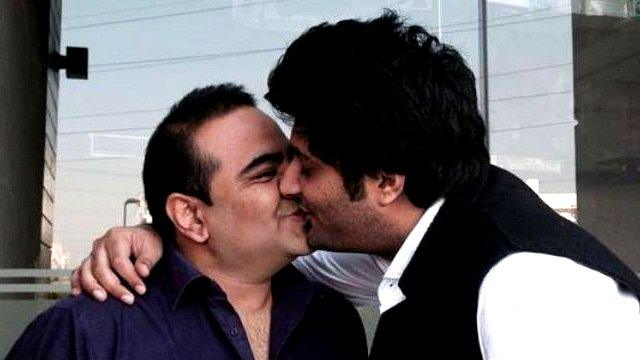Ireland's divisive referendum on same-sex marriage
- Published
Campaign groups from both sides have launched promotional videos, including one featuring Brendan O'Carroll, the star of Mrs Brown's Boys
Voters in the Republic of Ireland will take part in a national referendum on 22 May on legalising same-sex marriage.
The vote marks a pivotal moment in the evolving relationship between Church and State, pitting religious leaders against the government in an historically conservative and Catholic country.
The Church has urged the public to reject the proposal, while the major political parties say it is a civil not a religious matter and are campaigning for a Yes vote.
Opinion polls, external suggest 78% of people are in favour of altering the constitution to allow gay couples to marry. But former Equality Minister and government Chief Whip Pat Carey believes the final result will be much closer.
"In the major urban centres the Yes campaign is getting a good reception," he told the BBC. "But a lot of people in middle Ireland and among an older age group still don't feel comfortable about it."
Mr Carey came out earlier this year, external aged 67. He says his decision was not borne out of "bravery" but a desire to "energise" the Yes campaign.
"I am sorry I didn't speak out earlier but I didn't have the confidence or the courage," he said.
"It seems to have resonated with a lot of people in my own age bracket. I have got some very sad letters. There is a great deal of torment out there."
Gay rights in Ireland
2015
Ireland votes on 22 May
-
2013 Cabinet agrees to same-sex marriage referendum
-
2011 First same-sex civil partnership takes place
-
2010 Civil Partnership Act introduced
-
1993 Homosexuality de-criminalised
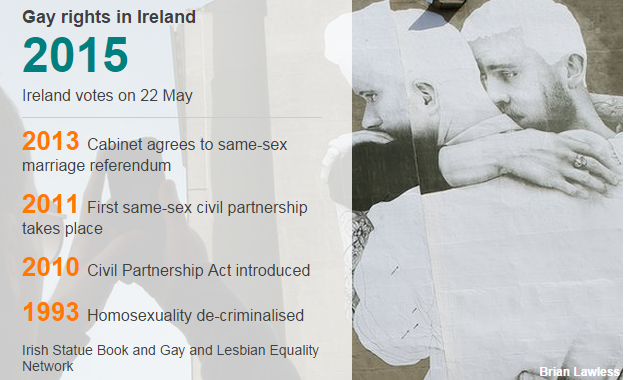
Raising a family
Homosexuality was illegal in Ireland until 1993, and Mr Carey believes a generation of gay men and women now deserve "some generosity" from the Irish people.
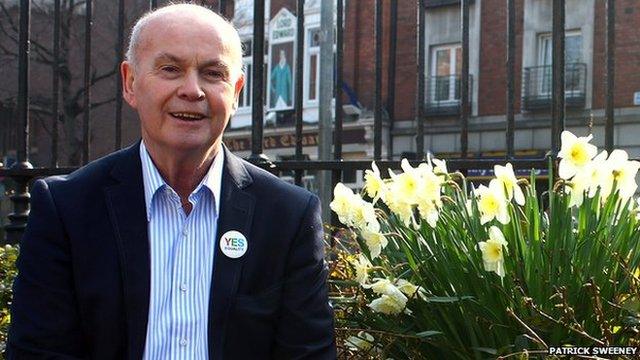
Mr Carey says a lot of gay people in Ireland live lonely and isolated lives
Catholic bishops, external and family rights campaigners argue that a Yes vote would encroach on religious beliefs and have implications for the welfare of children.
Keith Mills, an agnostic, gay man and member of the Mothers and Fathers Matter, external group, believes gay and lesbian couples are already catered for by the Civil Partnership Act of 2010, and have adequate next of kin and taxation rights.
Same-sex marriage would lead to gay couples adopting and using surrogates, he believes, depriving children "of a mother and father".
"Marriage is the gel that brings a couple together to raise a family. That should not be redefined," he added.
'This feels personal'
Rory O'Neill, an LGBT (lesbian, gay, bisexual and transgender) activist and drag queen considers such arguments "constitutionally bogus".
"The referendum asks if two people should enter in to marriage regardless of their sex. It has nothing to do with surrogacy or adoption or gay families," he added.
Last year, Mr O'Neill hit international headlines when he made an impassioned speech about homophobia; dressed as his alter ego Panti Bliss.
"This feels personal. Referendums in Ireland, especially on social issues, always get a bit nasty," he told the BBC.

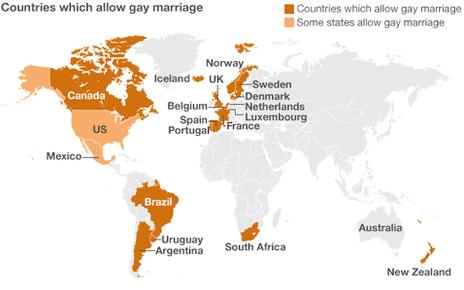
Why is Ireland holding a referendum?
Seventeen countries, and some states in US and Mexico, have legalised same-sex marriage through legislation or court rulings. Laws in Finland and Slovenia are pending
Ireland wants to change its constitution to extend civil marriage rights to same-sex couples
Any constitutional amendments must be approved by parliament and then put to the people in a referendum
On 22 May Ireland will ask its citizens if "marriage may be contracted in accordance with law by two persons without distinction as to their sex"
Only Irish citizens who are registered, external and living in the state can vote
Past referendums have been very divisive. In 1995, after fierce debate, a vote to legalise divorce narrowly passed by 51% to 49%

Heated debate
The two sides' positions have become deeply entrenched.
Activists from the No camp say they are regularly "shouted down" by their Yes side opponents, while LGBT campaigners say they have been subjected to demeaning posters and pamphlets, including one that likened voting for same sex marriage, to voting for Sharia., external
Mr O'Neill believes the issue should have been dealt with in parliament, rather than in public.
"I would have much preferred if it had happened through legislation. Now we are having to argue that we are ordinary, good people and the whole country gets to decide.
"It's actually a horrible situation to be in."
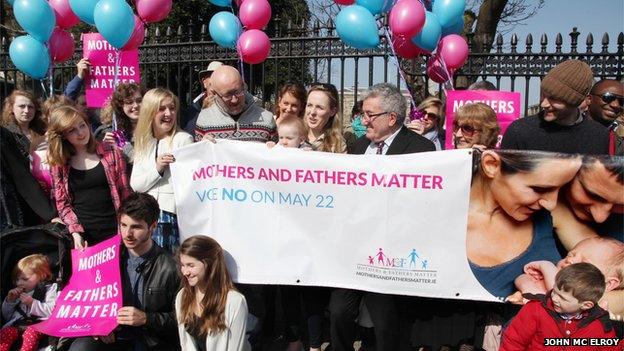
Keith Mills (centre left) says a Yes outcome would be "depressing" for a family orientated country like Ireland
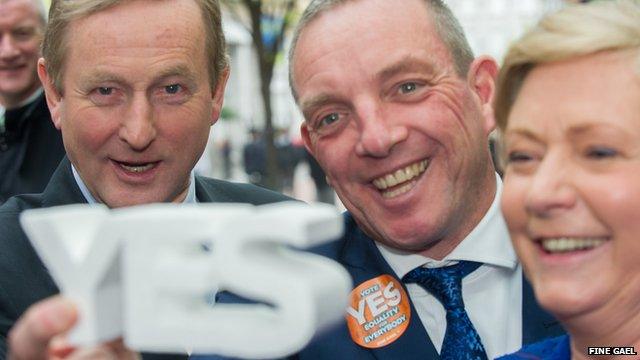
Irish Prime Minister Enda Kenny (L) says same-sex marriage will not diminish church or faith-based unions
Michael Kelly, editor of the Irish Catholic newspaper, external, says the eventual outcome will depend on turnout.
He will be voting No on the day, as he believes marriage is "a unique institution between a man and a woman".
"A lot of the Yes vote is quite soft," he said.
"While there is a lot of warmth towards this, people don't feel that strongly about it."
Pat Carey will spend the next few weeks trying to galvanise voters, in the hope that he can one day marry his partner.
"A woman said to me the other night, 'Pat will you marry me?'. She was highlighting that the two of us could get married and nobody would blink an eye.
"But if two gay people want to get married they have to consult 4.1 million people."
- Published1 September 2014
- Published11 June 2013
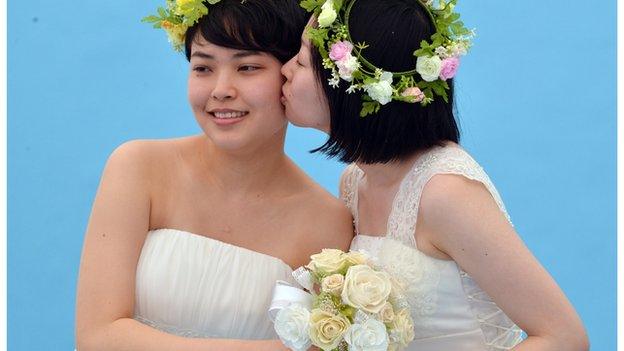
- Published28 March 2014
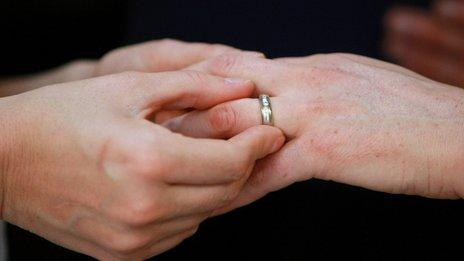
- Published13 December 2013
